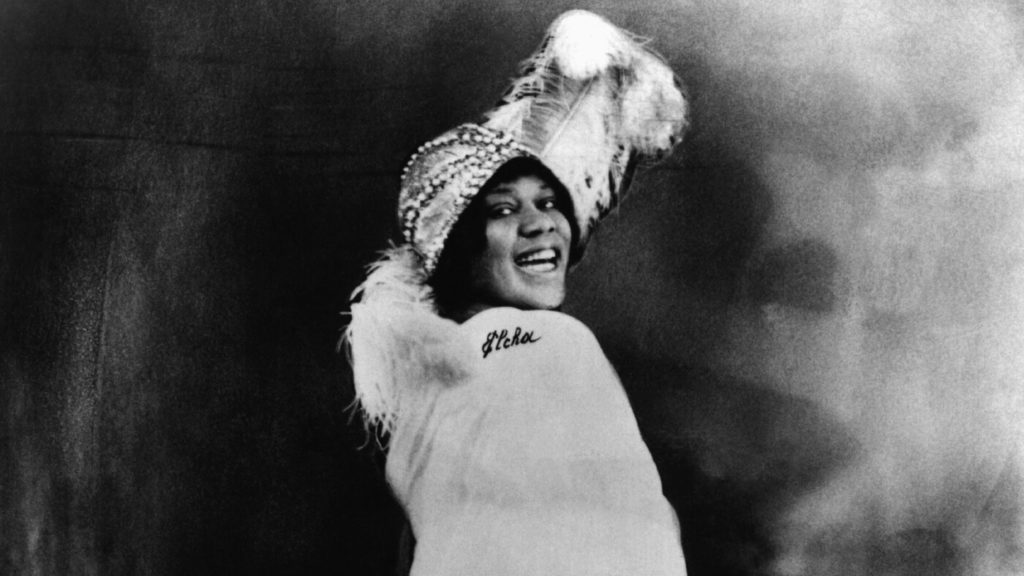Her Background
Bessie Smith was an American Blues Singer widely known during the Jazz Age. The Jazz Age was a period in the 1920s and 1930s in which jazz music and dance styles rapidly gained nationwide popularity in the United States. She was nicknamed the Empress of The Blues and was most popular during the 1920s and 1930s. Smith was born on April 15th, 1894 in Chattanooga, Tennessee. Due to her parents dying at an early age, Bessie and her brother performed on street corners for money in order to survive. It is clear that Bessie always had a passion for singing and performing which played a role in her success. In my opinion, the three things that made Bessie Smith become one of the most famous Blues singers was her passion, her career, and her legacy.

Her Passion
First, I want to talk about Bessie’s passion. As I mentioned earlier, as a little girl Bessie and her brother began performing as a way to make money. In 1904, her oldest brother Clarence left home and joined a small traveling troupe owned by Moses Stokes. “If Bessie had been old enough, she would have gone with him”, said Clarence’s widow, Maud. “That’s why he left without telling her, but Clarence told me she was ready, even then. Of course, she was only a child.In 1912, Clarence returned to Chattanooga with the Stokes troupe and arranged an audition for his sister with the troupe managers, Lonnie and Cora Fisher. Bessie was hired as a dancer instead of a vocalist since the company already included Ma Rainey. In 1904, Bessie was only 10 years old. At 10 years old she wanted to perform with her brother in a traveling troupe. At 10 years old, she knew that she wanted to be a singer. When she could finally follow her dreams at 18, Bessie took the opportunity to travel with the troupe, not even as a singer. This goes to show how bad Bessie wanted to perform and that she would get there by any means possible.
Her Career
Bessie Smith began forming her own act around 1913, at Atlanta’s “81” Theater. By 1920, she had established a reputation in the South and along the East Coast. She began her recording career in 1923. Bessie Smith was signed to Columbia Records in 1923 by Frank Walker, a talent agent who had seen her perform years earlier. Her first session for Columbia was on February 15, 1923; it was engineered by Dan Hornsby. As her popularity increased, Smith became a headliner on the Theatre Owners Booking Association (T.O.B.A.) circuit and rose to become its top attraction in the 1920s.Working a heavy theater schedule during the winter and performing in tent shows the rest of the year, Smith became the highest-paid black entertainer of her day and began traveling in her own 72-foot-long railroad car. Columbia’s publicity department nicknamed her “Queen of the Blues”, but the national press soon upgraded her title to “Empress of the Blues”. Smith’s music stressed independence, fearlessness, and sexual freedom, implicitly arguing that working-class women did not have to alter their behavior to be worthy of respect. Some of Bessie Smith’s famous songs are:
Back- Water Blues, Need A Little Sugar In My Bowl, and Baby, Won’t You Please Come Home.
Her Legacy
Finally, Bessie left an amazing legacy in the world of blues. At first, neither Bessie nor her music were accepted in certain circles. She once auditioned for Black Swan Records and was dismissed because she was considered too rough (low class). People compared her to Mamie Smith and they were often surprised when she became “the most successful diva”. Smith’s music landed her an induction into the Grammy Hall of Fame. More specifically, three of her singles, Downhearted Blues, St. Louis Blues, and Empty Bed Blues were inducted into the Grammy Hall of Fame for their qualitative and historical significance. In 2002, Smith’s recording of “Downhearted Blues” was included in the National Recording Registry by the National Recording Preservation Board of the Library of Congress. The board annually selects recordings that are culturally, historically, or aesthetically significant. “Downhearted Blues” was also included in the list of Songs of the Century by the Recording Industry of America and the National Endowment for the Arts in 2001, and in the Rock and Roll Hall of Fame‘s 500 songs that shaped rock ‘n’ roll. In 1984, Smith was inducted into the National Women’s Hall of Fame. The U.S. Postal Service issued a 29-cent commemorative postage stamp honoring Smith in 1994.





